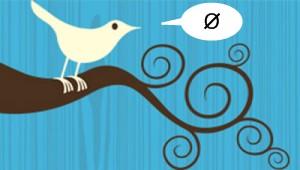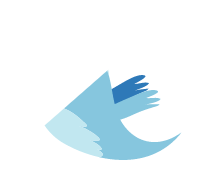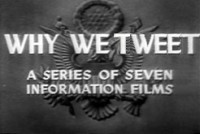
A Manifesto
I believe in Twitter. I believe people want to use it and that it is useful to them. I’m less sure of its susceptibility to monetization, but then again, I cover cameras and ramen-bots, not internet business. Still, since I’m coming down to the TechCrunch 50 conference in a few weeks, and will likely be the only person attending who does not use Twitter, I felt I should furnish an explanation. Not that I think it really matters to anyone whether I use it or not, but by striking preemptively, I’ll avoid talking myself hoarse in explaining it repeatedly to those of you I meet. I’m also curious to see if there are any other “abstwainers” (or better yet, “Tweetotallers,” either way I’ve coined a term) in the TechCrunch readership, and if so, what your perspective is.
Now, I’d be lying if I said I hadn’t been waiting for a chance to express myself on this (which may be why it is so very long (though my parenthetical style of writing shares the blame)), but it seems relevant enough and the timing is right. Please bear in mind that these are my own reasons for not using the service, not reasons for you to stop; I don’t mean to proselytize. I’ll start with my primary assertion: that a tweet is fundamentally valueless.
 Tweets have no value
Tweets have no value
What is a tweet? It is a quantity of data which I believe to be useless, at least in this context. What can be said in 140 characters is either trivial or abridged; in the first case it would be better not to say it at all, and in the second case it would be better to give it the space it deserves. Of course, there are exceptions to this rule: “It’s a boy!” for instance, is both sufficient and worth telling everyone you know (incidentally, congratulations to CrunchGear writer Matt on the new baby), but I think we all know that the bulk of Twitter is not life-changing announcements or granules of compact wit and wisdom. Nor is it meant to be — but intentions aren’t admissible in my court, sir.
To proceed: the “this context” I mentioned above is simply that tweets are broadcast indiscriminately. I think this further devalues them; an otherwise acceptable message (“Brunch at Hi-Spot at 1!”) becomes impersonal and meaningless when it’s sent to so many. Yes, there is @ for specifying another tweet or Twitterer (would that they had called the site something else, this accursed bird-based jargon drives me mad), but that just exacerbates things. I like to think of it this way: Twitter is a bunch of friends sitting around a table, all shouting at the same time — and shouting mundanities at that. The @ function just means you shout somebody’s name before the mundanity. Everyone else still has to listen. Conversation is impossible; every exchange is telegraphic (as is, unfortunately, increasingly true in other media).
But the tweet can have a link in it, of course, which makes it more versatile — except links are subject to the same value reductions as simple text. Tweeting a link is a lot like sending it to your whole address book. If you think everyone you know should see it, it better be worth shouting from the mountaintops. How rare that is! If you like other people finding your content for you, on their schedule, this isn’t a problem, but for me it is. Add in the fact that probably half of tweets are automatically generated, and what we’ve got here is a failure to communicate anything of value.
The natural objection to this is that you choose to follow people, you don’t have it forced upon you. True! I say, then, if someone is so regularly finding content of merit, why don’t they have a blog where the content can be given context, discussion, and perhaps a preview so people aren’t going in blind? I like reading interesting blogs. I don’t want to receive links every time someone finds something they think everyone should see. Twitter just adds another layer to the equation — and I don’t like layers.
So there you have it. Every tweet out there is either unnecessary or unnecessarily abbreviated. Why would anyone want to be the owner of such an awkward little package of data?
 It’s incomplete
It’s incomplete
This one might be controversial, but I embrace controversy. I make it uncomfortable. I put my hands in its back pockets. I kiss it on the lips. Twitter, therefore, I say is an incomplete and clumsy service. The halo of Twitter meta-services is indicative (in my opinion) less of the popularity of the service and more of how it falls short of the mark. When it isn’t down, Twitter provides A; people want A, B, and C.
It’s just text, sure, that’s what makes it Twitter — but simplicity isn’t the same as elegance (though the two are often seen together). URL-shortened image hosting services suggest people want to put their images right in the tweet-stream, or whatever you call it. Twitter applications like Tweetdeck (that’s one, right?) suggest that the web service is inadequate. And so on.
One could exaggerate the scope of Twitter’s service to being an alternative communication protocol at a basic level, like email or IM, and say that clients are a natural extension of that — but I think that’s disingenuous and wrong. Wrong because Twitter is meant to be simple, not fundamental. It’s a significant difference. Disingenuous because you know that’s not the case: if it were, Twitter would be better integrated with existing services.
I’m not blaming Twitter for not being what I would have liked it to be — but to jump on a service that looks like a transitional form, so to speak, seems unwise if there is no utility in it. I’ll get on at Twitter 2.0, thanks.
It replaces nothing and adds nothing
What did you do before you tweeted? It’s the social equivalent of an all points bulletin, or… a quasar or something. What did you do before when you needed to send something of little consequence or urgency to a bunch of people who may or may not want to see it? The only thing that comes to mind is skywriting. Nowadays there are more ways than I can count. Twitter is certainly a big one, but is it really better, easier, or faster than its competitors — say, Facebook’s feed? To the untrained eye (that is to say, to my eye), it looks as if Facebook has Twitter humbled in many ways (though if I’m honest, I’m not much of a Facebooker either).

Twitter is certainly more mobile — that much I grant it; Facebook should be much better at that, and the FriendFeed acquisition should sew that up pretty tight in the months to come. Twitter is certainly much better for featurephones (as opposed to smartphones), but that’s a bit of a moving target, since featurephones are getting smart and smartphones are getting cheap. If I took a picture of something crazy with my phone, I’d rather send it to Facebook than Twitter, though with Twitter it would probably reach more people, because Facebook’s feed is almost as simple, and far more robust. It’s worth mentioning here that I’m pretty much talking out of my ass, though, because I’m not an especially active user of Facebook, and I may have mentioned that I don’t use Twitter at all. But if you would forbid the argument ad ignorantium, well, there goes the entire internet.
News breaks alike on the followed and the unfollowed
As for spreading news, there I can see it might be helpful for some. Not that the same news that gets broken on Twitter couldn’t have been broken somewhere else, but Twitter news does have a certain something. A certain urgency, since it’s part of an expanding wave of retweets, and you’re expected to tweet it forward. I’m sure some of you are wondering how a blogger can get by without using Twitter. I would remind you that this article is appearing on TechCrunch, the world’s leading source of Twitter-based news. Every tweet coming into existence has to be personally approved by Mike and MG before it appears for the rest of the internet. With these guys on watch, I’ve got nothing to worry about. (They could stand to filter a bit more though)
The point is that I don’t see any particular reason to use Twitter rather than, say, relying on Facebook or RSS or even email. If it’s hot, it’ll spread one way or the other. And unfortunately, I can’t think of a less suggestive way of saying that.
Besides, (and I hate to trot out this old argument, but I think it’s applicable here) weren’t we saturated with information before Twitter came on the scene? Do we really need a constant hail of tweets in addition to the emails, IMs, messages, posts, votes, invitations, events, feeds, and god knows what else? I say thee nay! And on that point:
 It’s pure vanity
It’s pure vanity
This may sound a bit rich coming from a professional blogger, but I don’t like to broadcast myself. Before this post I have tried to restrict my self-reference on this blog and CrunchGear to things like “I’m more of a Canon guy, but…” or “SNES will always be superior to Genesis.” I think advertising yourself overtly or deliberately drawing attention is in poor taste, whether it’s tweeting your latest action, or having really big hair, or making everyone listen to your joke at a party. Vanity! Twitter encourages it. This is more of a philosophical point, so I won’t argue it too much here, but it’s my position that people should be saying fewer, more meaningful things, directed at people to whom they are relevant — as opposed to the equivalent of sending up a signal flare and screaming that you super hate mondays, blah!
It appeals to the reptilian part of the brain, I think. It’s an alpha male thing, having followers. When you’re broadcasting, you get to think people are paying attention, and who doesn’t like attention? But our attention is spread so thin these days that the portion devoted to something as minor as a tweet may as well be none at all. Broadcasting may console the ego, but it’s false consolation. What it is a surrogate for (meaningful attention) can’t be gotten that way.
Why do you tweet?
But enough of that. I could probably rattle off a couple more paragraphs on this and that, but I don’t want to abuse the reader’s patience. 1800 words is 1796 too many, when I could have simply pulled a Bartleby and said “I prefer not to.” You must understand, I thought it worth a thorough examining, considering TechCrunch and Twitter are joined at the hip. I console myself in that this article, though overlong to a degree you all will be revealing to me shortly, has still far fewer words than are found in an average week’s posts on Twitter.
 So here’s my question to you. Why do you, or why don’t you, use Twitter? This isn’t a trap; I’m genuinely curious, since it seems to provide some things for many, many things for some, and nothing to a (talented and handsome) few. Anything so polarizing is worth discussion, so — discuss.
So here’s my question to you. Why do you, or why don’t you, use Twitter? This isn’t a trap; I’m genuinely curious, since it seems to provide some things for many, many things for some, and nothing to a (talented and handsome) few. Anything so polarizing is worth discussion, so — discuss.
I only forbid one answer: “because everyone else is doing it.” That’s the same reason people wore Hammer pants.
[Update: Good to see so many responses. Very interesting. So much venom, though!]